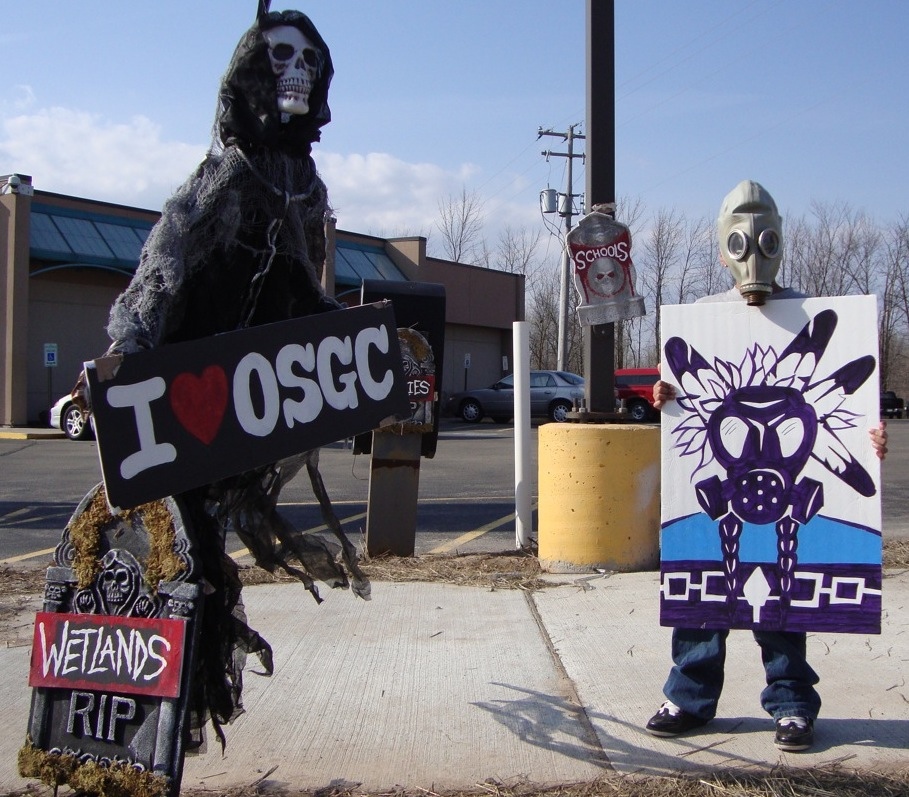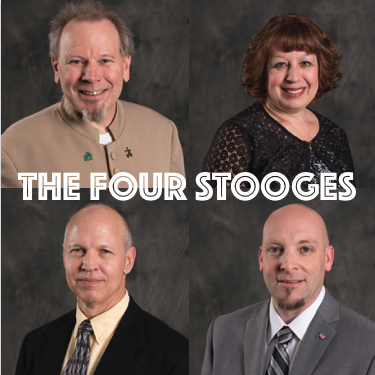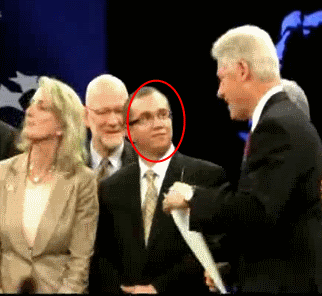02/28/2017 UPDATE:
- Look under ‘The Four Stooges’ picture below for OSGC’s & GBRE’s Response to the City of Green Bay’s Motion to Dismiss Plaintiffs’ Complaint, U.S. District Court, Eastern District of Wisconsin, Green Bay Division, Case No. 1:16-cv-01700, Oneida Seven Generations Corp. & Green Bay Renewable Energy, LLC v. City of Green Bay
Here’s a preview:
The City lured OSGC to start the project in Green Bay, causing OSGC to spend millions of dollars in reliance on the City’s approval of necessary permits. …
Over a year later…the City arbitrarily revoked those approvals based on reasons that were entirely fabricated. …
[T]he City intentionally sought to harm OSGC.
Previously on Oneida Eye:
- November 14, 2016 Action Report [Draft] for General Tribal Council Meetings on:
- VIDEO – August 10, 2016 (Original Meeting)
- VIDEO – October 2, 2016 (1st Reconvened)
- VIDEO – November 14, 2016 (2nd Reconvened)
EXCERPT FROM AUGUST 10, 2016: Motion by Sherrole Benton to rescind the December 15, 2013 action dissolving the Oneida Seven Generations Corporation and restrict the corporation to commercial leasing activities. Seconded by Loretta Metoxen. Motion not voted on; item tabled.
Amendment to the main motion by Allen R. King to approve all of the BC recommendations for Items 4.A.1–4. Chairwoman Tina Danforth ruled this motion out of order.
Amendment to the main motion by Nancy Skenandore that he as GTC want to know who are the leaders; who are the investors; who are the attorneys; who are the stockholders; who are the owners; who are the board members; how are they paid; what do they use for collateral; for this information be provided for the last 10 years; and to be reported at the next meeting. Seconded by Cathy Metoxen. Motion carried by show of hands.
Amendment to the main motion by Dan Hawk to allow Oneida Seven Generations Corporation to continue litigation with the City of Green Bay. Seconded by Sherrole Benton. Motion carried by show of hands.
EXCERPT FROM AUGUST 10, 2016: Motion by Frank Cornelius to table this item. Seconded by Linda Dallas. Motion carried by hand count: 845 support; 395 opposed; 16 abstentions.
EXCERPT FROM OCTOBER 2, 2016: Motion by [Oneida Business Committee Vice-Chair] Melinda J. Danforth to take the motion related to item 4.A.1. from the table. Seconded by Allen King. Motion failed by show of hands.
Therefore…
the Main Motion to “rescind” GTC’s Directive to dissolve OSGC…
and…
the Amendment to “allow” OSGC to sue the City of Green Bay…
were both tabled…
and…
GTC voted against taking them off the table…
and…
both remained tabled more than 3 months.
Thereby…
according to Robert’s Rules of Order…
both died.
Inexplicably, this frivolous lawsuit was filed anyway by Godfrey & Kahn SC on behalf of OSGC & GBRE against the City of Green Bay:
- December 23, 2016 Complaint & Jury Demand, U.S. District Court, Eastern District of Wisconsin, Case#1:16-cv-1700, Oneida Seven Generations Corporation & Green Bay Renewable Energy, LLC v. City of Green Bay
And now…


- February 7, 2017 Defendant’s Motion to Dismiss Plaintiffs’ Complaint, U.S. District Court, Eastern District of Wisconsin, Green Bay Division, Case No. 1:16-cv-01700, Oneida Seven Generations Corporation & Green Bay Renewable Energy, LLC v. City of Green Bay
Defendant City of Green Bay (the “City”), by its counsel, Gunta Law Offices, S.C., respectfully moves to dismiss the Complaint pursuant to Federal Rules of Civil Procedure 9, 12 and 17 as follows:
1. The Complaint should be dismissed under Rule 12(b)(6) for failure to state a claim upon which relief can be granted. In support of this defense, the City relies on the facts alleged in the Complaint and not on any matters outside the pleadings.
2. Plaintiff Green Bay Renewable Energy, LLC should be separately dismissed under Rule 12(b)(1) for lack of subject matter jurisdiction. In support of this defense, the City relies on the facts alleged in the Complaint and not on any matters outside the pleadings.
3. The City specifically denies that Plaintiffs Oneida Seven Generations Corporation and Green Bay Renewable Energy, LLC, have capacity to sue, and the Complaint should therefore be dismissed under Rules 9(a), 12(b)(2), and 17(b)(2). In support of this defense, the City relies on supporting facts as stated in Exhibit 1 to the Memorandum in Support of Defendant’s Motion to Dismiss the Complaint, filed herewith, and in the declarations of Gregg J. Gunta and Leah [Sue] Dodge in support of this motion, filed herewith.
The grounds for this motion are fully set forth in the Memorandum in Support of Defendant’s Motion to Dismiss and accompanying exhibits and declarations, filed herewith.
- February 7, 2017 Declaration of Gregg J. Gunta with Exhibits in Support of Defendant’s Motion to Dismiss Plaintiffs’ Complaint for Lack of Capacity to Sue, U.S. District Court, Eastern District of Wisconsin, Green Bay Division, Case No. 1:16-cv-01700, Oneida Seven Generations Corporation & Green Bay Renewable Energy, LLC v. City of Green Bay
- February 7, 2017 Declaration of Leah Sue Dodge with Exhibits in Support of Defendant’s Motion to Dismiss Plaintiffs’ Complaint for Lack of Capacity to Sue, U.S. District Court, Eastern District of Wisconsin, Green Bay Division, Case No. 1:16-cv-01700, Oneida Seven Generations Corporation & Green Bay Renewable Energy, LLC v. City of Green Bay
- February 7, 2017 Memorandum with Exhibits in Support of Defendant’s Motion to Dismiss Plaintiffs’ Complaint, United States District Court, Eastern District of Wisconsin, Green Bay Division, Case No. 1:16-cv-01700, Oneida Seven Generations Corp. & Green Bay Renewable Energy, LLC v. City of Green Bay
Defendant City of Green Bay (the “City”), by its attorneys GUNTA LAW OFFICES, S.C., respectfully submits this memorandum in support of its motion to dismiss the Complaint of Plaintiffs Oneida Seven Generations Corporation (“OSGC”) and its wholly-owned subsidiary Green Bay Renewable Energy, LLC (“GBRE”)….
INTRODUCTION
OSGC complains that it was deprived due process under the Fourteenth Amendment when the City rescinded OSGC’s conditional use permit (“CUP”) to build a solid waste incinerator. The decision to rescind the CUP has been processed to death. It was reviewed by the City under Wis. Stat. § 68.06, and the Wisconsin Circuit Court, the Wisconsin Court of Appeals, and the Wisconsin Supreme Court by certiorari. Attached to the Complaint as Exhibits A and B are the Wisconsin Court of Appeals and Wisconsin Supreme Court decisions and orders reversing the rescission and affirming the reversal, just as OSGC requested.
Rather than enforce the state court judgment as Wisconsin Statutes…entitle OSGC to do, OSGC and GBRE now seek federal review of the same decision along with damages The Complaint fails to allege that the available state court remedies are inadequate and fails to show that OSGC fully availed itself of those remedies. The Complaint also fails to identify a constitutionally protected property interest and fails to state a claim as a matter of law that the City’s decision to rescind the CUP was arbitrary in the constitutional sense. For these independent reasons, the Complaint fails to show a violation of substantive or procedural due process…and should be dismissed… .
The Complaint also fails to allege any facts pertaining to GBRE whatsoever beyond identifying itself as a Delaware corporation and OSGC’s subsidiary. GBRE has failed to state a claim and should be dismissed… and has failed to allege an injury in fact and should be dismissed….
In the alternative, the Complaint should be dismissed…for lack of corporate capacity to sue. OSGC is a tribal corporation chartered under the laws of the Oneida Nation. In 2013, the Oneida General Tribal Council – the governing body of Oneida Nation – voted to dissolve OSGC. The subordinate entity Oneida Business Committee has not dissolved OSGC. Instead, the Business Committee has stripped OSGC of its powers and limited its purpose to strictly “commercial leasing.” Then, shortly before OSGC filed this Complaint and in the face of tribal pressure to dissolve OSGC, the General Tribal Council considered a motion specifically designed to allow OSGC to pursue this lawsuit. After debate and consideration, however, the General Tribal Council voted to table that motion and never took any additional action. As such, the filing and prosecution of the present suit has never been authorized or approved.
[C]orporate capacity to sue is determined by the law under which a corporation was organized. Under Oneida Nation law, OSGC should not exist. To the extent OSGC exists at all, it is not authorized to bring the present lawsuit as it does not advance OSGC’s authorized commercial leasing activities. OSGC’s lack of capacity was confirmed when the General Tribal Council tabled the motion to prosecute this suit.
ARGUMENT
A. The Complaint, and GBRE in particular, should be dismissed for failure to state a claim pursuant to Rule 12(b)(6).
1. Facts as Alleged in the Complaint.
The City’s arguments…are based solely on the facts alleged in the Complaint. The City’s arguments…are based on supporting facts…. The following allegations from the Complaint provide the relevant background for dismissal….
OSGC sought to build a facility in Green Bay that would convert municipal solid waste into electricity by heating the waste at high temperatures to produce “syngas,” similar to natural gas or methane. … The City originally granted the CUP in March 2011 following a voluminous application and lengthy presentations by OSGC, and contingent upon compliance with City building code, building permits, standard site plan review and approval and all Federal and State environmental standards related to the proposed use. … While OSGC was obtaining the necessary permits and approvals, public opposition to the facility mounted. … Some faction of the opposition groups accused OSGC of lying in its application in order to obtain the CUP. … In response, the City held a public hearing. … OSGC submitted written materials and appeared before both the Plan Commission and the Common Council in defense of the CUP. … Following a public hearing, the Common Council voted seven to five to rescind the CUP, offering no explanation for its decision. … Later, the City Attorney sent a letter claiming that OSGC made “false statements and misrepresentations” regarding “the public safety and health aspect of the Project and the Project’s impact upon the City’s environment” and “emissions, chemicals, and hazardous materials.”
OSGC requested an administrative appeal. … The City Council denied the request…. OSGC then invoked its right to certiorari review of the City’s actions in Wisconsin state court. … The Wisconsin Circuit Court reviewed the City’s decision to rescind the CUP and denied OSGC’s petition for certiorari. …
OSGC then appealed to the Wisconsin Court of Appeals. … The Wisconsin Court of Appeals applied state law to determine “whether the City exercised [its authority to revoke a CUP based on misrepresentations made during the permitting process] in an arbitrary manner, and without substantial supporting evidence.” ... Finding that “the scant statements the City cites as support for its revocation action do not constitute substantial evidence of misrepresentation,” the Wisconsin Court of Appeals ordered that the Circuit Court decision be reversed. …
OSGC then requested that the City reissue the CUP. … The City did not reissue the CUP, but appealed to the Wisconsin Supreme Court. … The Wisconsin Supreme Court focused only on “whether the evidence was such that [the City] might reasonably make the order or determination in question.” … On March 29, 2015, it affirmed the Wisconsin Court of Appeals decision. …
OSGC does not allege to have taken any additional action on the order prior to filing this Complaint. … The Complaint alleges claims for violation of 42 U.S.C. § 1983 based on substantive and procedural due process. …
2. Standards of Review for Rule 12(b)(6).
To survive a motion to dismiss, the Complaint must contain “a short and plain statement of the claim showing that the pleader is entitled to relief.” … While the Complaint’s well-pled allegations must be accepted as true and all reasonable inferences drawn in its favor, …the Court “need not accept as true legal conclusions or threadbare recitals of the elements of a cause of action, supported by mere conclusory statements.” …
“A copy of a written instrument that is an exhibit to a pleading is a part of the pleading for all purposes.” … Consideration of the Exhibits does not convert this motion to dismiss into a motion for summary judgment. …
“When an exhibit attached to the complaint contradicts the allegations in the complaint, ruling against the nonmoving party on a motion to dismiss for failure to state a claim is consistent with the court’s obligation to review all facts in the light most favorable to the nonmoving party.”
3. OSGC has failed to state a claim because its available state court remedies satisfied substantive and procedural due process.
OSGC has received adequate process under the law, including relief from the very local land-use decision it now asks this Court to review. …OSGC must show that these state law remedies were inadequate. As to procedural due process, under Bettendorf v. St. Croix County, “[w]here a claimant has availed himself of the remedies guaranteed by state law, due process is satisfied unless he can show that such remedies were inadequate.” … (dismissing procedural due process claims based on a zoning designation where plaintiff himself initiated state court review and was afforded adequate process in state court system). As to substantive due process, the Seventh Circuit has repeatedly held that “in addition to showing that the decision was arbitrary and irrational, the plaintiff must also show either a separate constitutional violation or the inadequacy of state law remedies.” Polenz v. Parrott … (remanding substantive due process claim based on denial of an occupancy permit for a determination as to adequacy of state law remedies). OSGC has not alleged a violation of a substantive constitutional right. Its allegations that the City “acted arbitrarily and capriciously” do not cut it. Centres, Inc. v. Town of Brookfield, Wis. … (“Its allegation that the defendants acted … in an arbitrary and capricious manner does not supply the essential element of a separate constitutional violation.”) (dismissing substantive due process claim where plaintiff failed to allege that state law remedies were inadequate and had actually received state court review of the same land-use decision).
In terms of what constitutes adequate state law remedies, “scant process is all that is ‘due’ in zoning cases.” River Park, Inc. v. City of Highland Park… . “The opportunity to apply for a [writ of certiorari] is enough.” … (dismissing residential developer’s due process claim based on denial of a zoning application where the developer could have pursued common law writ of certiorari); see also Donohoo v. Hanson… (“[S]o long as there are adequate local or state means for obtaining review of a zoning decision, procedural due process is satisfied.”).
More robust constitutional protections are available under the Fifth Amendment and Equal Protection Clause, but OSGC has not invoked the Fifth Amendment and seeks only out-of-pocket expenses, lost profits, and legal expenses—not the market value of the property. In Behavioral Institute of Indiana, LLC v. Hobart City of Common Council, the Seventh Circuit affirmed that a complaint with identical features did not allege a Fifth Amendment takings claim. … Unlike a takings claim, the scope of property interests protected by due process in land-use cases is exceedingly narrow because “[s]tate and local governments are not required to respect property owners’ rights… State and local governments may regulate and even take property; they must pay for what they take but are free to use the land as they please.” … When it comes [to] claims based on land-use decisions, “Federal Courts are not zoning boards of appeal.”
The Complaint fails to allege that OSGC’s state court remedies were inadequate, and the facts alleged do not support such an inference. To the contrary, the Complaint incorporates, as exhibits, the decisions of the Wisconsin Court of Appeals and Wisconsin Supreme Court. These decisions were the fruit of OSGC’s “opportunity to apply for a writ”— an opportunity that satisfies procedural and substantive due process and defeats OSGC’s claim….
It is immaterial for purposes of the Due Process Clause whether, as OSGC alleges, “the City Council meeting on October 16, 2012 was not a meaningful hearing” or that “several alderpersons had ex parte communications with opponents of the project and made up their minds to rescind the CUP—even prior to the Council convening to consider the issue.” … OSGC had a full opportunity to air these grievances against the City in state court proceedings.
Perversely, OSGC appears to rely on the favorable state court decisions as proof of its denial of due process. That OSGC won in state court does not undermine the adequacy of due process OSGC received under state law — it reinforces it. Where a plaintiff has been relieved of a land-use decision by a state court, he cannot state a federal claim for due process violations. In Donohoo v. Hanson, a landowner alleged procedural and substantive due process violations for having been denied a permit to construct an addition to his lakefront home. … Before pursuing the federal lawsuit, Donohoo had filed a petition for a writ of certiorari in state court and, while the certiorari action was pending, was issued the land use permit. … The court rejected his due process claims: “Donohoo does not allege that state law remedies are inadequate. Moreover, such an allegation would be groundless. In this very case, Donohoo pursued a certiorari action. He subsequently obtained a land use permit.” … See also Harding v. County of Door… (finding no violation of condominium developer’s due process rights where the county withdrew a building permit based on a neighbor’s complaint, but the withdrawal was overturned by Wisconsin Court of Appeals); Minneapolis Auto Parts Co., Inc. v. City of Minneapolis… (finding no due process violation where plaintiffs were granted permits in state court proceedings).
The timing of the state law remedies also does not undermine their adequacy. OSCG alleges that it “proposed the waste-to-energy project when it did because of the availability of federal, state and local grants, tax deductions and other incentives [which] have expired, such that the project is no longer economically viable.” … It does not allege when these incentives expired relative to its available remedies, but it does not matter. Due process does not require that state law remedies arrive in time to preserve business expectations. In CEnergy- Glenmore Wind Farm No. 1, LLC v. Town of Glenmore, a wind farm developer complained that the city’s arbitrary failure to issue building permits in time to save a profitable power purchase agreement violated his right to due process. … As this Court observed, “[t]he fact that it might not have succeeded in time for CEnergy to meet its contractual deadline anyhow is of no moment. Due process requires only a state court remedy, not a guaranteed win by the applicant’s contractual deadline.” … (J. Griesbach, presiding), see also River Park v. City of Highland Park … (finding no due process violation where city deliberately delayed rezoning until developer went bankrupt); Harding … (finding no due process violation where condominium developer won reversal of zoning decision in state court but, by that time, lacked financing to complete the project).
Similarly, it does not matter that the state court remedies might not recompense OSGC for its alleged “out-of-pocket expenses of approximately $5.2 million, lost profits of approximately $16 million, and substantial legal expenses, including attorney’s fees to pursue the state court proceedings and this federal case.” … The amount of damages available under state law remedies does not undermine their adequacy. The contrary argument was squarely rejected in Barry Aviation, Inc. v. Land O’Lakes Municipal Airport Com’n:
The fact that a plaintiff “might not be able to recover under [state law] remedies the full amount which he might receive in a § 1983 action is not…determinative of the adequacy of the state remedies.” Hudson v. Palmer[.] “[U]nless the remedy which an injured party may pursue in state court can readily be characterized as inadequate to the point that it is meaningless or nonexistent,” courts should not ignore the Supreme Court’s warning that the Fourteenth Amendment should not be treated as a “‘font of tort law to be superimposed upon whatever systems may already be administered by the States.’” Easter House v. Felder[.]
4. OSGC has failed to state a claim because it has failed to vindicate its rights in state court.
While the state court decisions themselves are more than enough process to invalidate OSGC’s claim, they also made available additional state law remedies, namely enforcing the state court decisions. OSGC’s failure to pursue these additional state remedies provides an independent basis for dismissing the Complaint.
In zoning cases, a plaintiff must seek vindication in state court before seeking redress in federal court. The Seventh Circuit recognized in Gamble v. Eau Claire County that “even if a taking can be challenged as a denial of substantive due process, a suit based on this theory is premature if the plaintiff has possible state remedies against the zoning regulation or other state action that he wants to attack.” … CEnergy-Glenmore confirmed that this requirement applies to both procedural and substantive due process challenges. “Regardless of how a plaintiff labels an objectionable land-use decision (i.e. as a taking or as a deprivation without substantive or procedural due process), recourse must be made to the state rather than federal court.” CEnergy-Glenmore… (affirming a motion to dismiss where plaintiff failed to pursue his state law remedies); See also River Park… (“A person contending that state of local regulation of the use of land has gone overboard must repair to state court.”).
OSGC was entitled to enforce the state court judgments by execution pursuant to Wisconsin Statute § 815.01, “[t]he owner of a judgment may enforce the same in a manner provided by law,” and § 815.02:
Where [a judgment] requires the performance of any other act a certified copy of the judgment may be served upon the party…who is required to obey the same, and if he or she refuse he or she may be punished for contempt, and his or her obedience enforced.
If the City then failed to obey the judgment, OSGC could have brought a motion for contempt under Wisconsin Statute § 785.03(1)(a):
A person aggrieved by a contempt of court may seek imposition of a remedial sanction for the contempt by filing a motion for that purpose in the proceeding to which the contempt is related. The court, after notice and hearing, may impose a remedial sanction authorized by this chapter.
OSGC alleges that after the Court of Appeals’ decision, it “met with the City to request the re-issuance of the CUP” and then “sent a follow-up letter,” …that “[t]he City also refused OSGC’s request to re-issue the CUP after the Court of Appeals decision in favor of OSGC,” …and that “the City never re-issued the conditional use permit to OSGC[.]” ... [OSGC] does not allege that it ever attempted to enforce either the Wisconsin Court of Appeals or Wisconsin Supreme Court judgments by execution, let alone renew its request for the CUP after receiving the Wisconsin Supreme Court judgment.
This Court is free to ignore OSGC’s colorful, but conclusory allegation that “OSGC has exhausted its potential state law remedies. Only this honorable court remains as a venue to deliver justice to OSGC.” ... The allegation is contradicted by the Exhibits attached to the Complaint. OSGC cannot seek federal review of a local land-use decision without first taking full advantage of state law remedies, particularly when those remedies include a judgment that could eliminate the offending conduct if only OSGC would enforce it.
5. OSGC has failed to state a claim because it has failed to allege a constitutionally protected property interest.
The first element of a claim for deprivation of due process rights is “that the claimed interest is a protected property or liberty interest under the fourteenth amendment.” …
The interests OSGC alleges are subject to constitutional protection — “the construction, development and occupation of the waste-to-energy facility based on the CUP and the building permit issued by the City” and “its contracts for waste-to-energy with third-parties, and various grants and tax-credits for the project”—are all contingent on the CUP. …The CUP is not a protectable property interest and cannot support a contingent protectable interest.
Protectable property interests are defined by state law…and exist only when the state’s discretion is “clearly limited such that the plaintiff cannot be denied the interest unless specific conditions are met.” Brown v. City of Michigan City, Ind. Under Wisconsin law, including the decisions attached to the Complaint, not only is a CUP subject to a municipality’s discretion, it is explictily not property. “The decision to revoke a CUP, like the decision to grant one, involves the exercise of a municipality’s discretion.” … “A conditional use permit is not property; it is a type of zoning designation.” …
While the Supreme Court and Seventh Circuit have both acknowledged the “theoretical possibility that a land-use decision…could constitute a deprivation of property without substantive due process of law,” this possibility does not excuse the threshold requirement of a protectable property interest. … For example, Polenz found a protectable property interest in “the right of use” where the City of Oak Creek denied an occupancy permit, without which plaintiffs “could not occupy the premises for any use for a period of eighteen months.” (remanding for a determination on adequacy of state law remedies). And River Park, Inc. v. City of Highland Park found a protectable property interest in a zoning classification where state law required the City to grant the plaintiff’s zoning application. … (dismissing complaint because available state law remedies were adequate).
Neither the Supreme Court nor the Seventh Circuit has definitely concluded that a land-use decision actually amounted to a deprivation of property without substantive due process, let alone found that a CUP could support such a deprivation. When asked to do so by the wind farm developer in CEnergy-Glenmore, the Seventh Circuit remarked that “[w]hether CEnergy has even identified a property interest in the building permits it sought, its use of the land it leased, or its agreement with WPS is questionable, but we need not decide those issues.” … (dismissing due process claim for failure to show actions were arbitrary and failure to seek recourse under state law); see also Donohoo v. Hanson … (dismissing due process claims by “[a]ssuming, without deciding, that Donohoo’s requested use permit constituted a property interest that implicated due process…”). Similarly, this case is easily disposed of without addressing the issue, but if addressed, the Wisconsin state judgments are controlling. “A conditional use permit is not property.” …
6. OSGC has failed to state a claim because the decision to rescind the CUP was not arbitrary in the Federal constitutional sense.
OSGC must show that the City “exercised its power without reasonable justification in a manner that shocks the conscience,” Bettendorf, and “only the most egregious official conduct” qualifies. … “A plaintiff bears a very heavy burden in a substantive due process claim attacking a decision of local zoning officials.” ... “And rightly so, for the federal courts are not zoning boards of appeal and will not overturn merely erroneous decision.”
This Court recently applied the “shocks the conscience” test in CEnergy-Glenmore where the plaintiff alleged due process violations based on the Town of Glenmore unreasonably dragging its feet on a building application to kill a wind turbine project. .. There, as here, there were no allegations of “corruption or self-dealing by the members of the Town Board” and “no allegation that the Board was bribed or that members had a financial interest in killing CEnergy’s contract.” … As in the Complaint, the land-use decision was allegedly motivated by community opposition. … The Court held, “It is hardly surprising, or shocking, that an elected Town Board would be responsive to its more vocal constituents.” … The Seventh Circuit affirmed, “As far as the Constitution is concerned, popular opposition to a proposed land development plan is a rational and legitimate reason for a legislature to delay making a decision.” …
CEnergy governs here. OSGC has failed to allege facts that show the City acted arbitrarily in the constitutional sense and has, therefore, failed to state a claim for a violation of substantive due process.
7. As to GBRE, the Complaint fails to make any allegations beyond its citizenship, let alone state a claim upon which relief can be granted.
“Federal Rule of Civil procedure 8(a)(2) requires only ‘a short and plain statement of the claim showing that the pleader is entitled to relief,’ in order to ‘give the defendant fair notice of what the …claim is and the grounds upon which it rests.’” Bell Atlantic Corp. v. Twombly … GBRE appears exactly twice in the Complaint—once in the caption, and once in paragraph 12:
Green Bay Renewable Energy, LLC is a Delaware limited liability company with its principle place of business at 1239 Flightway Drive, DePere, Wisconsin 54115. It is a wholly-owned indirect subsidiary of Oneida Seven Generations Corporation, formed for the purpose of developing the facility.
Paragraph 12 is not a “short and plain statement” of GBRE’s claim, it does not show that GBRE is entitled to relief, and it does not give the City fair notice of GBRE’s claims. To the contrary, it is impossible from the Complaint to know why GBRE is named as a plaintiff. The only allegations of wrongdoing pertain to OSGC. See Complaint … (alleging that OSGC’s substantive and procedural due process rights were violated, that OSGC incurred out-of-pocket and legal expenses and lost profits, and that OSGC had a constitutionally protected interest in the CUP). As to GBRE, there is only paragraph 12.
Even parsing paragraph 12 does nothing to explain GBRE’s claim. The allegations that GBRE “is a wholly-owned indirect subsidiary of Oneida Seven Generations Corporation” and “was formed for the purpose of developing the facility” do not allow GBRE to piggy-back on OSGC’s allegations when, according to the Complaint, OSGC and GBRE are distinct corporations. … Laborers’ Pension Fund v. Lay-Com … (“A corporation exists separately from its shareholders, officers, directors and related corporations.” … Aetna Cas. and Sur. Co. of Hartford, Connecticut v. Kerr-McGee Chem. Corp. … (allowing a parent corporation to litigate subsidiaries’ claims – not a subsidiary corporation to litigate a parent’s claims). As such, the Complaint fails to state a claim as to GBRE.
B. GBRE has failed to allege injury in fact and should be dismissed pursuant to Rule 12(b)(1) for lack of subject matter jurisdiction.
1. Standard of Review under Rule 12(b)(1)
“Article III of the constitution limits federal judicial power to certain ‘cases’ and ‘controversies,’ and the ‘irreducible constitutional minimum’ of standing contains three elements. Silha v. ACT, Inc. … (quoting Lujan v. Defs. Of Wildlife … “To establish Article III standing, ‘a plaintiff must show (1) it has suffered an ‘injury in fact’ that is (a) concrete and particularized and (b) actual or imminent, not conjectural or hypothetical; (2) the injury is fairly traceable to the challenged action of the defendant; and (3) it is likely, as opposed to merely speculative, that the injury will be redressed by a favorable decision.” … (quoting Friends of the Earth, Inc. v. Laidlaw Envtl. Servs. (TOC), Inc. …“As the party invoking federal jurisdiction, a plaintiff bears the burden of establishing the elements of Article III standing.” …
There are two types of subject matter jurisdiction challenges, factual and facial. … A facial challenge argues that the plaintiff has not sufficiently “alleged a basis of subject matter jurisdiction.” … For facial subject matter jurisdiction challenges under Rule 12(b)(1), “a court should use Twombly-Iqbal’s ‘plausibility’ requirement, which is the same standard used to evaluate facial challenges to claims under Rule 12(b)(6).”
2. The Complaint does not allege that GBRE has suffered an injury in fact.
As the party invoking federal jurisdiction, GBRE bears the burden of establishing standing. The Complaint does not allege that GBRE suffered any injury at all, let alone that it was injured by the City, or that a favorable decision will redress its injury. ... The only injury alleged in the Complaint is to OSGC. … (alleging that OSGC’s substantive and procedural due process rights were violated, that OSGC incurred out-of- pocket and legal expenses and lost profits, and that OSGC had a constitutionally protected interest in the CUP).
The allegation that GBRE is “a wholly-owned indirect subsidiary of [OSGC]” does not support an inference of injury to GBRE. … A parent company has Article III standing on the basis of injury to a subsidiary because injury to a subsidiary can cause “actual financial injury” to the parent, and a judicial determination as to the rights of the subsidiary “would prevent such injuries.” ... The opposite is not true. A subsidiary does not have standing on the basis of injury to a parent company—injury to the parent company does not cause actual financial injury to the subsidiary, and a judicial determination as to the rights of the parent has no impact on the rights of the subsidiary.
C. The Complaint should be dismissed under Rules 12(b)(2), 9(a), and 17(b)(2) for lack of corporate capacity to sue.
1. Facts Relevant to Dismissal Under Rule 9(a) and 17(b)(2).
The following facts are submitted solely for the purpose of the City’s arguments under Rule 9(a), and not for purposes of Rule 12(b)(6).
Plaintiff OSGC is “a tribal corporation chartered under the laws of the Oneida Nation, a federally recognized Indian tribe.”… Plaintiff GBRE is “a Delaware limited liability company” and “wholly-owned indirect subsidiary of Oneida Seven Generations Corporation.” …
According to the OSGC Corporate Charter, the Charter was granted by the Oneida Business Committee based upon authority vested in it by the Oneida General Tribal Council. …
As described by the Oneida Nation constitution, the General Tribal Council is “[t]he governing body of Oneida Nation” and is “composed of all the qualified voters of the Oneida Nation.” … The Business Committee consists of nine elected members and is empowered by the constitution to “perform such duties as may be authorized by the General Tribal Council.” …
On December 15, 2013, the General Tribal Council moved to dissolve OSGC. … The motion was recorded as “Motion by Cathy L. Mextoxen to dissolve [Oneida] Seven Generations Corporation and for Frank Cornelius to assist and work with the Business Committee on the dissolution, seconded by Scharlene Kasee. Motion approved by a hand count: 814 yes, 689 no, 69 abstained, total-1,572.” …
On December 24, 2013, the Oneida Business Committee adopted “BC Resolution 12-24- 13-A Reorganization of Oneida Seven Generations Corporation.”… The resolution was “to begin the process of dissolution of the Oneida Seven Generations Corporation in a business-like manner.” … It acknowledged that “the General Tribal Council and the Oneida Business Committee have been informed that dissolution of Oneida Seven Generations Corporation may take up to or exceed 10-12 months in order to minimize negative financial consequences and wind up the activities of the corporation in a business-like manner.” … Under the resolution, Article VI of the OSGC corporate charter, “PURPOSES AND POWERS” was modified as follows:
The purpose of this Corporation is to engage in
any lawful activity within the purposes for which the corporation may be organized under the Oneida Constitution and Oneida tribal laws, ordinances and jurisdictionactivities related solely to the purposes of commercial leasing. …On May 27, 2015, the Oneida Business Committee adopted “BC Resolution 5-27-15-B Adoption of Amendments to the Oneida Seven Generations Corporate Charter Limiting Purposes to Commercial Leasing Activities Only.”… This Resolution recognized that “the General Tribal Council, on December 15, 2013, directed the Oneida Business Committee to dissolve the corporation” and “the Oneida Business Committee began the process of dissolution of the corporation by adoption of amendments to the corporate charter limiting its purposes, removing the board of directors, and appointing an agent for the sole purposes of dissolving the corporation in a financially responsible manner.” ... It also recognized that OSGC, GBRE, and the Oneida Tribe had been “sued in regard to alleged contract violations.” ...
[T]he litigation, began in early 2014, remains yet unresolved and subject to the appeals process, such that the Oneida Business Committee has determined that a longer term solution and compliance with the General Tribal Council directive is needed to clearly limit the corporation to commercial leasing and restrict its powers and authorities to maintaining the value of existing assets.
[Footnote: The 2014 litigation was the suit by ACF Leasing, LLC, ACF Services, LLC, and Generation Clean Fuels, LLC, against Green Bay Renewable Energy, LLC, Oneida Seven Generations Corporation and the Oneida Tribe of Indians of Wisconsin [n/k/a Oneida Nation in Wisconsin]. ACF Leasing, LLC et al. v. Green Bay Renewable Energy, LLC et al.,No. 1–14–3443 …]
The Oneida Business Committee, therefore, resolved to amend the OSGC Corporate Charter again … such that Article VI, “PURPOSES AND POWERS,” now states:
The purpose of this Corporation is to engage in activities related solely to the purposes of commercial leasing. The Corporation is prohibited from engaging in any action not specifically for the purposes of commercial leasing and nothing in the powers granted under this Articke [sic] shall be interpreted to authorize any other purpose or power. In the event of any cause for interpretation of the purposes and powers granted in this article, such interpretation shall be narrowly construed to limit the purposes and powers to commercial leasing activities. The powers of the Corporation are: …
(H) To sue and be sued in its Corporate name as herein specifically provided to the extent allowed by Oneida tribal, state or federal law upon any contract, claim or obligation of the Corporation arising out of the accomplishment of its purposes…
On August 10, 2016, there was a special General Tribal Council meeting. … In response to pressure to finally dissolve OSGC as resolved by the General Tribal Council in 2013, opponents to the dissolution moved “to rescind the December 15, 2013 action dissolving the Oneida Seven Generations Corporation and restrict the corporation to commercial leasing activities.” … The motion was amended as “to allow Oneida Seven Generations Corporation to continue litigation with the City of Green Bay.” … This amendment to the motion was made specifically to allow OSGC to continue litigation against the City of Green Bay. … The main motion to rescind OSGC’s dissolution was not voted on. Instead, proponents of the dissolution moved to table it. … Ex. 9, [August 10, 2016 GTC Meeting VIDEO] at 2:44:29 (Frank Cornelius addressing the General Tribal Council: “What I think we should do is table the main motion because… the General Tribal Council already voted… to close it and you didn’t do that… the Business Committee failed…”). The General Tribal Council voted to table the main motion and its amendments. … On October 2, 2016, the meeting reconvened, and a motion was made to take the item from the table, but this motion failed. …
The General Tribal Council follows Robert’s Rules of Order. … Under “Robert’s Rules of Order As Used by the General Tribal Council,” a motion to table “has the effect of taking the entire subject matter out of discussion.” … When tabled in a special meeting like the August 10, 2016 meeting, “the matter dies, unless there is another meeting scheduled to discuss the subject.”
This lawsuit was initiated by plaintiffs OSGC and GBRE on December 23, 2016. … The Complaint alleges due process violations based on the City’s decision on October 16, 2012, to rescind a conditional use permit that would have allowed OSGC to build a waste-to-energy facility. … OSGC has already litigated the decision in Wisconsin courts and won a reversal. …
2. Standard of Review for 9(a) and 17(b)(2), Capacity to Sue.
Under Rule 9(a), “a pleading need not allege…a party’s capacity to sue or be sued,” but a party may raise the issue “by a specific denial, which must state any supporting facts that are peculiarly within the party’s knowledge.” … “Capacity to sue or be sued is determined…for a corporation, by the law under which it was organized.” …
“Questions involving a party’s capacity to sue or be sued [] turn on issues of fact” and “must therefore be identified in either a responsive pleading or motion.” Swaim v. Moltan Co. … “The pleading requirements for capacity thus correspond to those for personal jurisdiction.” ... As to the requirements for personal jurisdiction,
A complaint need not include facts alleging personal jurisdiction. However, once the defendant moves to dismiss the complaint under federal Rules of Civil Procedure 12(b)(2) for lack of personal jurisdiction, the plaintiff bears the burden of demonstrating the existence of jurisdiction.
The precise nature of the plaintiff’s burden depends upon whether an evidentiary hearing has been held. When the district court holds an evidentiary hearing to determine jurisdiction, the plaintiff must establish jurisdiction by a preponderance of the evidence. However, when the district court rules on a defendant’s motion to dismiss based on the submission of written materials, without the benefit of an evidentiary hearing, as the district court did here, the plaintiff, ‘need only make out a prima facie case of personal jurisdiction.’ In evaluating whether the prima facie standard has been satisfied, the plaintiff ‘is entitled to the resolution in its favor of all disputes concerning relevant facts presented in the record.’ …
3. OSGC lacks capacity to bring the present suit.
Rather than dissolve OSGC as directed by the General Tribal Council in 2013, the Business Committee amended the OSGC Corporate Charter. Before the dissolution, the purpose of OSGC was “to engage in any lawful activity within the purposes for which the corporation may be organized under the Oneida Constitution and Oneida tribal laws, ordinances and jurisdiction,” and OSGC was empowered to sue on any claim “arising out of the accomplishment of its purposes.” … At the time this lawsuit was filed, OSGC was “prohibited from engaging in any action not specifically for the purposes of commercial leasing…” … OSGC may still sue on claims of the Corporation “arising out of the accomplishment of its purposes,” but its purposes are strictly limited to “commercial leasing.” ... In determining whether the present lawsuit “arise[s] out of the accomplishment” of commercial leasing, OSGC’s powers and purposes “shall be narrowly construed to limit the purposes and powers to commercial leasing activities.” …
The claims raised in the Complaint do not “arise out of the accomplishment” of commercial leasing activities. Any rights that might even tangentially impact OSGC’s ability to commercially lease the property at issue were already determined by the Wisconsin Court of Appeals and Wisconsin Supreme Court. … The state court lawsuits reversed the City’s decision to rescind a conditional use permit (and affirmed the reversal), restoring the conditional use permit and any commercial leasing interest OSGC may have had in the conditional use permit. ... This lawsuit will not accomplish any commercial leasing activities, and OSGC is “prohibited” from bringing it.
But to even reach this analysis presupposes the ongoing existence of OSGC. Under Oneida law, the will of the Business Committee is clearly subordinate to that of the General Tribal Council. The Constitution and By-Laws of the Oneida Nation designates the General Tribal Council as “the governing body of the Oneida Nation.” … The Oneida Constitution also instructs the Business Committee to “perform such duties as may be authorized by the General Tribal Council.” ... This structure is affirmed in the Corporate Charter of Oneida Seven Generations which was granted by the Business Committee “based upon authority vested in it by the Oneida General Tribal Council.” …
The 2013 General Tribal Council resolution to dissolve OSGC stripped the business committee of any authority to continue OSGC’s corporate charter. At the time this lawsuit was filed on December 23, 2016, OSGC should no longer have existed under the law of Oneida Nation.
Whether or not OSGC still exists, and whether or not the present lawsuit accomplishes a commercial leasing activity, any doubts as to whether OSGC was authorized to bring the present lawsuit were resolved on August 10, 2016 by the General Tribal Council. The capacity of a corporation to sue is determined by the state of its incorporation, even if the corporation is dissolved. … Williams v. Bd. of Educ. of Chi. … (applying the law of the state of incorporation pursuant to Rule 17(b)(2) to determine a dissolved corporation’s capacity to sue). The Constitution and By-Laws of the Oneida Nation are silent on whether a dissolved corporation can sue… but the General Tribal Council — the governing body of the Oneida Nation – entertained a motion specifically designed to allow OSGC to continue litigation against the City of Green Bay. … That motion did not pass. … It was tabled, and died. … This lawsuit should have died with it.
As to GBRE, even if OSGC continues to exist, it cannot delegate authority it does not have. GBRE has no more capacity to sue the City than OSGC.
CONCLUSION
OSGC has failed to show that its state law remedies were inadequate, failed to exhaust those remedies, failed to identify a protectable property interest, and failed to show that the decision to rescind the CUP was arbitrary in the constitutional sense. For each of these independent reasons, the Complaint fails to state a due process violation cognizable under § 1983 and should be dismissed pursuant to Rule 12(b)(6) for failure to state a claim.
As to GBRE, the Complaint has failed to allege anything at all beyond its own citizenship, let alone state a claim upon which relief can be granted or injury in fact sufficient to confer standing. GBRE should be dismissed pursuant to either Rule 12(b)(6) for failure to state a claim or 12(b)(1) for lack of subject matter jurisdiction.
The Complaint should further be dismissed because OSGC and GBRE lack of capacity to sue under Rules 12(b)(2), 9(a), and 17(b)(2).
Dated this 7th day of February, 2017.
GUNTA LAW OFFICES, S.C.
Attorneys for Defendant, City of Green Bay

OSGC … BTFO
In 2010, the Oneida Seven Generations Corp. (OSGC) received city permission to build a power plant fueled by municipal solid waste. However, after construction started, the City Council revoked the conditional use permit. Now, the tribal corporationis seeking to recover damages. It is seeking $5 million to recover expenses and $16 million in lost profits, plus other costs.
Instead of responding to the OSGC claims, the city’s attorneys make a two-fold argument for why the case should be dismissed: the tribal company failed to exhaust its options in state court, and it doesn’t make a valid due process violation claim.
On the first point, the city notes that after the Wisconsin Supreme Court ruled nn May 2015 that the city improperly revoked the plant’s permit, OSGC never followed up with the courts to have the court order implemented. …
On the second point, the city argues that OSGC fails to meet the federal standards for making a due process violation claim. …
The city’s brief also argues that the OSGC wasn’t authorized by the Oneida General Tribal Council to pursue the lawsuit.
The tribe has several weeks to respond to the city’s filing, and the city gets to reply to that before any hearings would be scheduled or decision made by the judge.
What is OSGC’s and Ron Van Den Heuvel’s ‘waste-to-energy’ scheme partner Abdul Latif Mahjoob’s American Combustion Technologies, Inc. / ACTI up to lately…
other than changing names to American Renewable Energy Inc. / AREI, and American Renewable Technologies, Inc. / ARTI and working with new sketchy fronts like ProMaxx Advanced Fuels and Gander Corporation?
ACTI is being sued… for FRAUD:
- December 5, 2016 Order Granting Plaintiff’s Motion to Compel Defendants Mahjoob et al. to Produce Documents, U.S. District Court, District of Nevada/Las Vegas, Case No. 2:2015CV694, CH2E Nevada LLC v. Abdul Latif Mahjoob & American Combustion Technologies Inc. / ACTI
This action arises out of a business dispute. … Plaintiff purchased specialized equipment from Defendants, which allegedly did not perform as promised. …
Additionally, Defendants did not provide certain documents that Plaintiff asserts they were contractually required to provide. … Plaintiff therefore brought claims for fraudulent inducement, negligent misrepresentation, breach of contract, breach of warranty, and revocation…
The Court agrees with Plaintiff. Plaintiff’s complaint alleges that Defendants provided equipment that, “as designed and manufactured,” cannot “function at the levels promised and warranted by Defendants.” … The information Plaintiff seeks is relevant and necessary to determining whether manufacturing defects exist.
FLASHBACK – February 14, 2013:

OSGC Cheerleader v. Every Generation
See also:
- January 23, 2017 Hearing re: Report & Recommendation, U.S. District Court, Eastern Wisconsin, Docket No. 16-CR-64, United States of America v. Ronald H. Van Den Heuvel, Paul Piikkila, and Kelly Van Den Heuvel
1:45 pm [Asst. U.S. Attorney Matthew] Krueger informs the Court of separate ongoing federal investigations, government in possession of approximately 313,000 pages of material, potential relevance, and agrees the volume of material is not realistic for manual review.
- January 31, 2017 Wisconsin Supreme Court Opinion, Case No. 2015AP2676-D, In the Matter of Disciplinary Proceedings Against Ty Christopher Willihnganz, Attorney at Law; Office of Lawyer Regulation v. Ty C. Willihnganz
¶4 This proceeding arises from Attorney [Ty] Willihnganz‘s professional involvement with a Green Bay businessman and family friend, [Ronald H. Van Den Heuvel].
¶5 In approximately 2010, Attorney Willihnganz, who had taken a break from the practice of law to pursue other career interests, returned to Green Bay and the practice of law. He negotiated an agreement with [Ron Van Den Heuvel], whereby [Ron Van Den Heuvel] agreed to provide Attorney Willihnganz with office space for his legal practice and to pay his State Bar of Wisconsin bar dues and CLE expenses in exchange for Attorney Willihnganz providing certain legal services to [Ron Van Den Heuvel] and his new energy startup, Green Box [NA Green Bay, LLC].
¶6 The working arrangement proved stressful and Attorney Willihnganz described it as a “pretty desperate time” when, in March of 2013, an individual who had invested $600,000 in Green Box [NA Green Bay, LLC] filed a lawsuit in Brown County circuit court against [Ron Van Den Heuvel] and Green Box [NA Green Bay, LLC], alleging that his investment was obtained by fraudulent misrepresentation. Attorney Willihnganz’s brief representation of [Ron Van Den Heuvel] and Green Box during his administrative license suspension gave rise to this disciplinary proceeding. …
¶57 IT IS FURTHER ORDERED that Ty Christopher Willihnganz is publicly reprimanded for his professional misconduct.
¶58 IT IS FURTHER ORDERED that within 60 days of the date of this order, Ty Christopher Willihnganz shall pay to the Office of Lawyer Regulation the costs of this proceeding, which total $5,028.97 as of October 6, 2016.
¶59 IT IS FURTHER ORDERED that the director of the Office of Lawyer Regulation shall advise the court if there has not been full compliance with all conditions of this order.
- January 31, 2017 Notice of Plea Hearing of Troy Wragg scheduled for March 2, 2017 at 10:30 a.m before the Honorable Joel H. Slomsky, U.S. District Court for the Eastern District of Pennsylvania, Case No. 2:15-cr-398-JHS, United States of America v. Troy Wragg, Amanda Knorr & Wayde McKevly
March 2, 2017:

NBC 10 WCAU – Philadelphia: Temple University Graduate Admits to Running $54M Green-Energy Ponzi Scheme; The scam allegedly ran from 2005 until 2009, even after the Securities and Exchange Commission filed a civil lawsuit against Wragg and Knorr’s Bala Cynwyd-based Mantria Corp.
A Temple University graduate admitted Thursday that he ran a $54 million Ponzi scheme built on false promises of green energy technology that would turn trash into fuel and “carbon-negative” housing developments, neither of which were ever fully developed.
Troy Wragg, now living in Georgia, pleaded guilty in federal court in Philadelphia on Thursday to conspiracy and securities fraud. His college girlfriend, Amanda Knorr, pleaded guilty last year, while Wayde McKelvy, a 54-year-old securities salesman from Colorado, is scheduled to go on trial in September. …
Two months before the SEC civil lawsuit, the company was publicly recognized for its stated commitment to “help mitigate global warming” by former President Bill Clinton’s Clinton Global Initiative. The company was cited for its plans to develop the biochar technology that it said would sequester carbon dioxide and reduce emissions in developing countries. Wragg appeared on stage with Clinton at the event in September 2009
- Philadelphia Inquirer: Two years out of Temple, he built a $54 million Ponzi scheme
Their 2015 indictment came six years after the Securities and Exchange Commission filed suit against the company in Colorado, shut down the firm, and obtained acourt order barring its principals from raising new funds. Various people linked to the company and its associated entities have agreed to a $6 million settlement with investors.
Wragg said little in court Thursday, answering routine questions from Slomsky as he entered his plea. He is likely to face a prison term of up to about 20 years under federal sentencing guidelines. ,,,
According to court filings, Wragg saw McKelvy as a lifeline for Mantria as it struggled under the weight of the 2008 collapse of the real estate market.

Prosecutors have painted the Colorado man as a shameless huckster who lured investors to Mantria in flashy seminars he called “Speed of Wealth” clubs and promising yields as high as 484 percent.
He hired celebrities, including NFL Hall of Fame player John Elway, to draw crowds while selling them on the company’s projects, such as its purported 4,500-home development in Tennessee and a $3.2 million plant in Dunlop, Tenn., devoted to the production of “biochar,” a green-energy charcoal substitute made from environmental waste.
Investors could “get paid just by owning land and spreading this stuff [biochar] all over your field, because this stuff pulls the toxins out of the atmosphere,” McKelvy is quoted in court filings as telling potential investors in a May 2009 seminar.
- Minneapolis Star Tribune: Man admits to running $54M green-energy Ponzi scheme
Prosecutors say the trio lied to investors, saying their “biochar” technology and “carbon-negative” housing in Tennessee made millions of dollars, but they had almost no earnings, and the three used the money to repay earlier investors and kept some for themselves.
McKelvy, who prosecutors say has never been licensed to sell securities, raised money through his Speed of Wealth seminars in Colorado, Las Vegas and elsewhere, including one that featured a speech from former Broncos quarterback John Elway.
McKelvy allegedly told investors that Mantria was the next Microsoft and that it was “on the cusp of a revolutionary technology that’s going to change the world, and you guys can benefit from it by putting money in and getting stinkin’ wealthy.”
Prosecutors say the housing developments that Mantria told investors would serve as collateral were never finished — the sites lacked drinking water and some may have contained unexploded artillery shells. Mantria then promised returns of more than 500 percent based on trash-to-fuel technology they said they had orders to sell.
The company had a site testing the production of biochar in Dunlap, Tennessee, but prosecutors say the company never had a patent for the technology to sell the systems and lied about how much it was producing.

- Green Bay Mayor Jim Schmitt Returns Illegal Campaign Donation To Oneida Nation of Wisconsin-Owned Oneida Seven Generations Corporation (OSGC) [Oneida Eye has been informed that Jim Schmitt – who openly supported and advocated for OSGC’s & scheme partner Ron Van Den Heuvel’s ‘waste energy’ proposal – traveled to Santiago, Dominican Republic, along with OSGC subsidiary IEP Development LLC‘s President & CEO Marc Hess on May 7, 2012, to tour a ‘waste energy’ facility, but that Schmitt will only acknowledge that the trip was paid for by “donors.” … In other words, ‘What really happened in Santiago stays in Santiago.’ … {Time will tell…}]

- Oneida Nation On Wisconsin-Owned Oneida Seven Generations Corporation Gave Illegal Campaign Donation To Green Bay Mayor Jim Schmitt [UPDATE 2: Mayor Schmitt Returns Illegal Donation To OSGC] (Explains that Schmitt’s illegal campaign donation was from OSGC’s corporate officers & executives who were current and former Legislative Affairs Directors of the Oneida Nation on Wisconsin, and thus had to have known that Wisconsin election law prohibits corporate contributions, so donations were begun using the National Indian Gaming Commission / NIGA while NIGA Chair & Spokesperson [and Tribal Advisor to Blue Stone Strategy Group LLC] Ernie Steven Jr.’s son – OBC Member Brandon Yellowbird Stevens – was the Oneida Business Committee’s Liaison to OSGC.)
02/13/2017 UPDATE:
…Green Bay Mayor Jim Schmitt was told a year ago that a campaign finance investigation against three aldermen had been closed but said nothing. Schmitt, in December 2015, requested the investigation after one was launched into his campaign finances. The probe into the Mayor’s finances ultimately led to misdemeanor conviction charges against him.
Aldermen Tom De Wane, Andy Nicholson and Chris Wery contended at the time that Schmitt’s request for an investigation into them was nothing more than retaliation for the probe against Schmitt. De Wane said that he had no involvement in requesting the investigation against Schmitt. Schmitt made the request to Milwaukee County Assistant District Attorney Bruce Landgraf, who was also investigating Schmitt’s campaign finances.
Throughout the past year, much of the media coverage of the Schmitt probe included mention of the ongoing investigation against the three aldermen. …
In September 2016, Landgraf announced he was charging Schmitt with three misdemeanor offenses. Schmitt pleaded guilty [December 5, 2016] to misdemeanor charges of making false statements on campaign finance reports, attempting to accept funds from someone other than the reported contributor and attempting to accept funds in excess of the individual contribution limit. He was ordered to pay a $4,000 fine and serve 40 hours of community service.
A citizen has petitioned the Green Bay City Council for Schmitt’s removal from office. The Council will hold a hearing on that [removal] petition on [Monday, February 20, 2017].
- February 2, 2016 Letter from Milwaukee Asst. District Attorney Bruce Landgraf to Atty. Matthew W. O’Neill re: closing of campaign finance investigation of Green Bay Aldermen Chris Wery, Andy Nicholson, and Tom DeWane
02/14/2017 UPDATE:
- Green Bay Press-Gazette: Aldermen: Mayor’s tactics ‘deceitful’ in ‘retaliatory’ finance probe he knew had been called off; Schmitt’s motives for misleading media questioned
Three aldermen [Chris Wery, Tom DeWane, and Andy Nicholson,] are accusing Mayor Jim Schmitt of launching a campaign finance probe against them and then sitting for a year on the news that the probe came up empty. …
Wery said he learned only Friday that Schmitt knew a special prosecutor had discounted Schmitt’s accusations against the aldermen…but the mayor still told the media an investigation was underway. …
Milwaukee County Assistant District Attorney Bruce Landgraf, serving as a special prosecutor in this case, responded in writing in February 2016 saying he would not pursue Schmitt’s accusations. …
But Schmitt still told Press-Gazette Media in April that Landgraf was investigating the aldermen’s campaign finances.
“Why, when he was notified there would be no investigation, did he withhold that information?” Wery asked. “Jim Schmitt’s deceitful, dishonest tactics were only meant to damage the aldermen and shift the spotlight off his illegal campaign activity.” …
Landgraf rejected several attempts by Press-Gazette Media over the past year to get an update on the investigations. …
Wery and the others suggested from the beginning that Schmitt’s accusations were just retaliatory. …
A City Council hearing on whether to remove Schmitt from office is scheduled for [Monday, February 20, 2017].
Schmitt acknowledged earlier Tuesday that he received a letter from the special prosecutor indicating he would take no further action on investigating the aldermen.
“Is it my job to share a personal letter?” he asked.
02/15/2017 UPDATE:
Schmitt’s lawyer, Patrick Knight, on Wednesday filed a petition asking Brown County Circuit Court Judge Marc Hammer to stop the hearing. …
In January, Council President Tom De Wane and Vice President Mark Steuer hired Milwaukee attorney Jeremy Levinson to guide the council through the removal hearing. On Feb. 7, the council notified Schmitt it would hold the hearing on Feb. 20. …
“He feels we don’t have the right to do this. The attorney we hired says we do,” De Wane said. “I really expect whoever looks at this filing will allow us to go forward.”
The case has been assigned to Outagamie County Judge John Des Jardins.
- February 14, 2017 Petition for Writ of Prohibition, Brown Co. Case No. 2017CV193, James Schmitt v. City of Green Bay Common Council
02/16/2017 UPDATE:
You’ve gone way too far this time, Lyin’ Sack o’ Schmitt…
Green Bay Mayor Jim Schmitt lashed out at a trio of city council members during a recent Political Radar podcast, alluding that some aldermen may be dealing with mental health problems or broken home lives.
“If I hammer someone down and they speak over me or they make these, just terrible comments like a punk kid would on a playground, I just can’t believe he says those kinds of things,” Schmitt said. “But then sometimes I write it off to mental health cause I hear he’s got, you know, some of these guys have some issues, and then if you look at their personal lives, they’re broken…and not that I feel sorry for them, but that gives me a little bit of a framework and that’s how I can deal with it.”
Get a load of this steamin’ pile o’ Schmitt:
About ‘broken home lives’… Mayor Schmuck,
HOW DID YOUR BROTHER THE PRIEST
FEEL ABOUT YOUR FELONIOUS LIES
NAMING HIM IN YOUR CRIMES?
SUFFERING GENETIC BOUT OF
‘TEMPORARY INSANITY,’
OR ‘KLEPTOMANIA’
(OR ‘POSSESSED’)
?????
Part of them highlight two December 2013 donations, listed on receipts from the initials C S. Landgraf, the prosecutor, says the dates are consistent with a corporate contribution from Cantilever Studios, LLC, of Suamico. But an amended report filed in January of last year lists donations on those dates from Carl Schmitt – the mayor’s brother and a priest in Sturgeon Bay.
Landgraf says “The ‘C S’ amendment is remarkable for several reasons.” He notes a corporate donation would be prohibited by law, and that the amendment was done at at time when Schmitt’s committee was already being publicly criticized.
According to the criminal complaint, Carl Schmitt told investigators he doesn’t remember donating any money to his brother. Rev. Schmitt did not respond to FOX 11’s interview request Monday.

Ledger of ILLEGAL CAMPAIGN DONATION from ONEIDA SEVEN GENERGATIONS CORPORATION to GREEN BAY MAYOR JIM SCHMITT
- Green Bay Press-Gazette Editorial Board: Green Bay Mayor must step down
These were not honest mistakes, but concerted efforts to cover one’s tracks.
If a donor gives you a $5,000 check, which exceeds the $1,040 maximum, you return it. If you erroneously accepted it, then you return it when your error is pointed out. That’s an honest mistake.
You don’t keep it and then list five separate $1,000 donations from the donor and four of his family members. That’s deceit.
It’s a lie that Schmitt had a part in. A campaign worker filled out the campaign finance form but left the names blank. “The candidate, Jim Schmitt, however, filled in the name column,” the complaint said.
If you receive two $25 donations from a corporation, which, again, is against the law, when you realize your misstep, or it’s brought to your attention, you return the donations. That’s correcting an honest mistake.
To keep the money and fudge the campaign finance forms is dishonest. In this case, Schmitt accepted two donations from a corporation, Cantilever Studios. On a campaign finance report there were no donations listed from Cantilever Studios, but there were two donations made on the same days for the same amount from “CS.” That report was later amended and Schmitt wrote the name of his brother, “Carl Schmitt,” below “CS.”
Those are only two of the examples, but the criminal complaint shows Schmitt was involved in the deception. They were moves by an elected official who tried to skirt the law instead of returning the funds and risk getting nothing.
It was a ruse to keep two $25 donations.
One of the puzzling aspects of the case is he didn’t need the money. Schmitt ended up with more than $25,000 in the bank after his re-election bid. He didn’t need the $50.
That’s what troubles us the most.
Schmitt was willing to falsify reports in an attempt to keep his office. It’s not like he overlooked something or was ignorant of the law. When informed of the mistakes, he tried to mislead the public.
We can’t accept such deceptive behavior from the top city official, who should be held to a higher standard.
…As is often the case in government, the cover-up is worse than the crime. Campaign finance errors by themselves generally don’t rise to the level of needing to resign, but the mayor’s subsequent cover-up and attempts to mislead do.
…[T]he ends don’t always justify the means, and in this case the mayor crossed a line. When confronted with a problem, he tried to bury it instead of addressing it. …
He must resign because of the monumentally poor judgment and dishonesty he displayed. Doing so will allow the city to continue to move forward.
02/20/2017 UPDATE:
- Green Bay Press-Gazette: Judge allows Schmitt hearing to go forward
“The implied premise that he stopped being mayor and was no longer bound by the associated duties and roles … is sleight of hand,” [the Common Council’s attorney Jeremy] Levinson wrote. “He remained the mayor, a public official. When he opted to commit campaign finance crimes to keep his office and to file fraudulent records with the city clerk, he was both an incumbent candidate and the mayor.”
Schmitt’s petition also claimed holding the hearing would cause him substantial legal expenses, great political harm and public embarrassment.
In his response, Levinson argued Schmitt cannot be harmed by public scrutiny since he chose a career in politics.
“Scrutiny comes with the job,” Levinson argued.
- February 20, 2017 Decision & Order of Judge John Des Jardins, Brown Co. Case No. 2017CV193, James Schmitt v. City of Green Bay Common Council
Violating campaign laws as an incumbent attempting to retain an office, however, cannot always be viewed as unconnected to the incumbent’s actions as an elected official. When the violations indicate some merging of the official’s role as candidate with his role as incumbent elected official, the requisite connection to satisfy the cause requirement of [state statute] could be found. The Common Council has alleged, for example, that in the course of violating campaign finance laws, Schmitt used his official position as Mayor to direct the City Clerk to conduct an audit of his campaign finance reports, thus merging his acts as mayor with his acts as a candidate. As a result, the Common Council has shown that it is proceeding on alleged wrongs connected to Schmitt’s actions as Mayor.
Under the circumstances of this case, the Court does not find grounds to grant the extraordinary remedy of a writ of prohibition. Schmitt retains the alternative remedy of certiotari review if the Common Council votes to remove him on grounds without a sufficient connection to his capacity as mayor Therefore, the Court finds that a writ of prohibition is not appropriate.
ORDER
Schmitt’s Petition for a Writ of Prhohibition is DENIED. Schmitt is not entitled to an award of his costs and disbursements.
- Monday, February 20, 2017 Agenda of the City of Green Bay Common Council, Council Chambers, Room 203, City Hall
PUBLIC HEARINGS (TO BEGIN AT 7:00 P.M.)…
Quasi-Judicial Hearing on petition for removal of Mayor James J. Schmitt from the Office of Mayor.
02/20/2017 LATE UPDATE:
- Green Bay Press-Gazette: Schmitt narrowly survives removal vote
The City Council found there was cause to remove Schmitt from office, but Alderman Randy Scannell’s decision not to back Schmitt’s removal kept him in office.
The council voted 9-3 to find there was cause to remove Schmitt after a tense, hourlong hearing and close to three hours of closed session deliberations.
But Scannell’s decision not to support removing Schmitt deprived the council of the nine votes needed to remove Schmitt from office. …
“To vote no on this would be to tell people that you tolerate some corruption in our election process. In the context of how local government operates, there’s nothing more important than elections,” Alderman Tom Sladek said. …
The hearing focused on resident Scott Vanidestine’s petition that Schmitt should be removed from office because he pleaded guilty to three misdemeanor campaign finance violations.
“The enormity of the evidence shows Mayor Jim Schmitt’s intent to deceive (the public) and he should be removed from office,” Vanidestine said. “This has eroded trust in the mayor. I don’t trust him anymore. I wouldn’t do business with the city anymore. I do not believe he can lead our city.”

“I’m Mayor Sssschmitt. Welcome to Green Bay! Wanna do businessss? Trusssst me!”
The Green Bay City Council fell one vote short of removing Mayor Jim Schmitt from office. The council voted 8-4 to remove him but state law required nine votes — a three-quarters majority. The vote came at 11:13 p.m., after more than four hours of arguments and deliberations.
“It’s a sad day for the City of Green Bay when you have two thirds of the council that absolutely doesn’t share confidence in the Mayor, and I think well over half the public,” [Alderman Guy] Zima said. “How can we face the public and say the standards we set for the mayor are lower than the standards we set for every other employee in the City of Green Bay?”
Additional information regarding this meeting can be found online:
FOUR MEMBERS of GREEN BAY’s COMMON COUNCIL
- RANDY SCANNELL
- BARBARA DORFF
- BILL GALVIN
- JOE MOORE
…LACK the COMMON SENSE and DECENCY to HONOR THEIR DUTY to POLICE THEIR OWN CHIEF OFFICER and hold him MEANINGFULLY ACCOUNTABLE for…
MULTIPLE CRIMINAL VIOLATIONS
and COVER-UP ATTEMPTS
to DECEIVE the PUBLIC
about DONATIONS…
WHILE IN OFFICE.
Instead,
THOSE FOUR HAVE SELFISHLY & COWARDLY PLACED THAT BURDEN ON THE PUBLIC’s BACK.

HEY!
FOUR STOOGES…
READ, WATCH, and TAKE NOTES.
HERE’S WHAT ACCOUNTABILITY LOOKS LIKE:
Back to the Oneida Clown Show…
02/28/2017 UPDATE:
- February 28, 2017 Plaintiffs’ Response in Opposition to Defendant’s Motion to Dismiss the Complaint, U.S. District Court, Eastern District of Wisconsin, Case#1:16-cv-1700, Oneida Seven Generations Corporation & Green Bay Renewable Energy, LLC v. City of Green Bay
Actual quotes:
The City lured OSGC to start the project in Green Bay, causing OSGC to spend millions of dollars in reliance on the City’s approval of necessary permits. …
Over a year later…the City arbitrarily revoked those approvals based on reasons that were entirely fabricated. …
[T]he City intentionally sought to harm OSGC.
tl;dr version:
We deserve points for recovering a fumble … because time was running out.
We say it.
We believe it.
That settles it.
- February 28, 2017 Affidavit of Amber C. Coisman w/ Exhibits A–G, U.S. District Court, Eastern District of Wisconsin, Case#1:16-cv-1700, Oneida Seven Generations Corporation & Green Bay Renewable Energy, LLC v. City of Green Bay
- February 28, 2017 Affidavit of Lisa Summers w/ Exhibit A, U.S. District Court, Eastern District of Wisconsin, Case#1:16-cv-1700, Oneida Seven Generations Corporation & Green Bay Renewable Energy, LLC v. City of Green Bay
Where did the OBC come up with ‘Exhibit A’?

FLASHBACK:
- November 8, 2000: Oneida Business Committee Resolution 11-08-00-B, Dioxin and Other Persistant Organic Pollutants
WHEREAS, the ability of our Native community to be protected from the [e]ffects of dioxin poisoning is critical to the future of our tribal nations and all life that sustains us, and…
WHEREAS, tribal communities and families continue to be disproportionately exposed to dioxin and other persistent organic pollutants. Many of our tribal members are more susceptible to these dangerous toxins due to our land-based culture and subsistence practices, and…
WHEREAS, dioxin has been classified as a “known human carcinogen” with the “highest” level of certainty by the International Agency for Research on Cancer, and acknowledged by the World Health Organization that dioxin exposure is linked to severe health effects…
NOW, THERE, BE IT RESOLVED: that the Oneida Tribe of Indians of Wisconsin requests that the United States State Department pursue ending the production and release of Dioxin and other Persistent Organic Pollutants in the United States.
- March 7, 2011: Greenaction for Health & Environmental Justice’s Evaluation of the Oneida Seven Generations Corporation Proposal for a Pyrolysis Gasification facility at the Oneida Nation of Wisconsin
…Emissions Source tests conducted at the Romoland facility in June-July 2005 confirmed this technology emits dioxin and other toxic air contaminants as well as other pollutants. [The] preliminary evaluation of the test results found some emissions exceeded those from typical garbage incinerators. …

W8 … WUT … ?!∞
We respectfully urge the Oneida Nation to reconsider this project that would pollute the environment and undermine true renewable energy efforts, and instead pursue safer, truly green and viable economic development projects.
APRIL 4, 2013:
Some [Oneida] Tribal members are looking at possibly shutting down the Oneida Seven Generations Corporation. Leah Dodge says the Tribal corporation has been misleading people about possible harmful effects from a proposed gasification plant, and it’s time to give up on the project. …
“There will be liabilities if the [Oneida] Seven Generations Corporation is dissolved, but the greater liabilities would result if Oneida Seven Generations [Corp.] – with its current leadership – is allowed to construct this incinerator.”
- April 11, 2013 OBC Emergency Meeting Minutes re: Fmr. OBC Chair Ed Delgado’s request for OBC to acknowledge and address the blatant contradiction between OBC Resolution 11-08-00-B, ‘Dioxin and Persistent Organic Pollutants,’ versus OBC Resolutions in support of OSGC’s admitted Dioxin-emitting projects, but the ignorant & corrupt OBC voted to reaffirm its support for OSGC’s experimental Dioxin-emitting incinerator projects:
A. Executive Session
1. Rescind resolution 12-08-10-B Supporting Oneida Seven Generations and Oneida Energy in the Development of the Waste-to-Energy Projeect
Sponsor: [Fmr. OBC Chair] Ed Delgado
Motion by [Fmr. OBC Treas.] Tina Danforth to reaffirm resolution 12-08-10-B Supporing Oneida Seven Generations and Oneida Energy in the Development of the Waste-to-Energy Project, seconded by Paul Ninham. Motion carried unanimously:
Ayes: Melinda J. Danforth, Tina Danforth, Vince DelaRosa, Greg Matson, Patty Hoeft, David Jordan, Paul Ninahm
Not present: Bradon Stevens
In fact, the Oneida Business Committee voted on April 11, 2013, to reaffirm OBC Resoluton 12-08-10-B, which states that the OBC supports OSGC & subsidiary Oneida Energy Inc. …
…as corporations wholly owned by the Tribe constructing this facility on the Oneida Reservation….
HOWEVER, the Hurlbut St. parcel in the City of Green Bay – where the OBC told the media their reaffirmation vote supported building OSGC’s experimental waste incinerator – IS NOT “on the Oneida Reservation.”
- 04/12/2013 Green Bay Press-Gazette: Oneida Business Committee reaffirms alt-energy support; Board still stands behind Green Bay gasification plant
While waging the court fight [against the City of Green Bay], Oneida Seven Generations also has sought to locate a similar gasification plant on tribal land west of Green Bay.
Tribal members opposed to the project have circulated a petition for a General Tribal Council [Meeting] – similar to a public referendum – on the issue.
That gathering is scheduled for May 5.
Leah Dodge, a leader of the petition drive, said Thursday’s action by the Oneida Business Committee signals the importance of a referendum that stops the gasification concept from going forward.
“Now the General Tribal Council will have to step up to do the job to protect the Oneida Tribe, which the Business Committee abdicated,” Dodge said.
On May 5, 2013, General Tribal Council voted to prohibit OSGC & its subsidiaries from engaging in ‘gasification,’ ‘waste-to-energy’ and ‘plastics-to-oil’ anywhere on the Oneida Nation in Wisconsin Reservation…
…but OSGC & Co. did it anyway:
1. Status report regarding zoning finding for building usage
Sponsor: [Fmr. OBC Chair] Ed Delgado
The following OBC Resolution was proposed by some OBC members (but was rejected by a majority of rejects) following media reports of an illegal ‘open-flame’ operation being conducted by OSGC’s business partners in OSGC’s 1201 O’Hare Boulevard facility – ON the ONEIDA NATION in Wisconsin’s Reservation – in violation of local zoning ordinances.
- REJECTED – November 25, 2013 Oneida Business Committee Resolution Draft, ‘Clarification of General Tribal Council Action Regarding Waste-to-Energy Activities’
WHEREAS, the Oneida General Tribal Council is the duly recognized governing body of the Oneida Tribe of Indians of Wisconsin, and
WHEREAS, the General Tribal Council has been delegated the authority of Article IV, Section I of the Oneida Tribal Constitution, and
WHEREAS, the Oneida Business Committee may be delegated duties and responsibilities by the Oneida General Tribal Council and is at all times subject to the review powers of the Oneida General Tribal Council, and
WHEREAS, the General Tribal Council met on to discuss the opportunity of implementing a waste-to-energy facility on the Reservation, and
WHEREAS, the General Tribal Council adopted the following motion:
“…to direct the BC to stop Oneida Seven Generations Corporation from building any gasification or waste-to-energy or plastic recycling plant at N7329 Water Circle Place, Oneida, Wisconsin or any other location within the Oneida Tribal reservation boundaries.”
WHEREAS, the discussion regarding waste-to-energy and other similar activities identified the General Tribal Council is of the opinion that this technology may result in causing health and environmental damage; and
WHEREAS, the Oneida Business Committee has identified a need to clarify the application of this action of the General Tribal Council to allow it to be fully implemented to meet the opinion of the General Tribal Council;
NOW THEREFORE BE IT RESOLVED that the Oneida Business Committee directs that all corporations, entities, and enterprises of the Tribe shall not engage in, or allow tenants or lessees to engage in, the business of operating a waste-to-energy, plastics recycling, or other similar technology on Tribal fee or trust property within the Reservation.
IT IS FURTHER RESOLVED that all corporations, entities, and enterprises of the Tribe who are engaged in, or who have tenants or lessees engaged in the business of operating a waste-to-energy, plastics recycling or other similar technology shall take necessary steps to cease those operations in a reasonable and timely manner.
FAILED:
2 Ayes: [Fmr. OBC Sec.] Patty Hoeft, [Fmr. & Illegal] Council member David Jordan.
3 Nays: [Fmr. OBC Vice-Chair] Greg Matson; Council member [& OSGC Liaison] Brandon Stevens; [Fmr.] Council member Paul Ninham.
As a CONSEQUENCE of OBC’s
& OSGC’s DANGEROUS
INTRANSIGENCE…
On December 15, 2013, General Tribal Council voted to direct the Oneida Business Committee to dissolve Oneida Seven Generations Corporation, and for Frank Cornelius, Sr., to work with the OBC on OSGC’s dissolution.
The Oneida Business Committee has failed…
…and treacherously & treasonously squanders & encumbers General Tribal Council’s assets.
Article IV – Powers of the General Tribal Council
Section 1. Enumerated Powers. – The General Tribal Council of the Oneida Nation shall exercise the following powers, subject to any limitations imposed by the statutes or the Constitution of the United States: …
(c) To veto any sale, disposition, lease or encumbrance of tribal lands, interests in lands, or other tribal assets of the Nation. …
(e) To manage all economic affairs and enterprises of the Oneida Nation.



